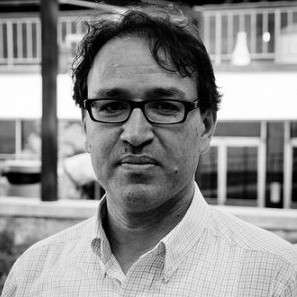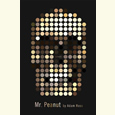Officially a Genius
Poet-translator Khaled Mattawa has won a MacArthur grant
Let’s just go ahead and call this Khaled Mattawa’s year: in January he was appointed chancellor of the Academy of American Poets, and now he has been named a 2014 MacArthur Foundation Fellow. What this most recent honor means in lay terms: Mattawa has just won a $625,000 “genius” grant. The award comes with no strings attached, but Mattawa told the Detroit Free Press that he will use the funds to further his translations of Arabic poetry.
 When he was a student at the University of Tennessee in Chattanooga, Mattawa had intended to work as a journalist after graduation, but during a senior-year creative-writing class he fell in love with poetry, later pursuing poetry as a graduate student at the University of Tennessee in Knoxville. He has since become an award-winning poet and translator, and during the Arab Spring he became the unofficial voice of the Libyan diaspora. Mattawa, who immigrated to the U.S. as a teenager, has published four books of his own poetry and nine translations.
When he was a student at the University of Tennessee in Chattanooga, Mattawa had intended to work as a journalist after graduation, but during a senior-year creative-writing class he fell in love with poetry, later pursuing poetry as a graduate student at the University of Tennessee in Knoxville. He has since become an award-winning poet and translator, and during the Arab Spring he became the unofficial voice of the Libyan diaspora. Mattawa, who immigrated to the U.S. as a teenager, has published four books of his own poetry and nine translations.
The fall issue of The Kenyon Review includes a long essay by Mattawa called “Identity, Power, and a Prayer to Our Lady of Repatriation: On Translating and Writing Poetry.” It opens with a description of the interplay between reading and writing, and between writing and translating, particularly for a homesick young man a long way from home:
n December 1988, in my last year in college, I travelled for a week to New York and took Lorca’s Poet in New York with me. I realize the narcissism implied in the sentence, but I’d been carrying the book with me for months at the time. And while on Atlantic Avenue in Brooklyn a day or so later, in an Arab grocery story, I found some books of Mahmoud Darwish. Back in the room where I was staying, I’d read a poem by Lorca and put it aside, read some Darwish and translate it into English, and then went back to Lorca, and so on. In between, I wrote some of my own lines. I didn’t know Spanish, but I could read Lorca out loud for cadence. And there was Darwish’s Arabic, and my own versions of his poetry in English. I had four floods of poetry coming at me, and what I put down was perhaps an expression of the whirlpool they created in me.
Being inspired to write while reading happens to all poets, and happens to composers as well. They start playing something by another composer and then their own “original” work comes through. Other than directly quoting Arab poets in my work, I’ve yet to understand how translation contributes to my process of composition, except to say that, like rhyme or meter or any rule we set up for our poems, translation adds a focus on precision, the focus that forces one to be creative.
This episode in Brooklyn happened nine years into my life in the U.S., where I came at the age of fourteen—fully aware of who I am in a cultural sense. I was a foreigner and knew that alterity would stay with me for some time. I felt that foreignness when I first read Walt Whitman. His America just did not speak to me then. I needed something in English, but that was also in my “language.” Translating Arab poets offered me a chance to experiment with sensibilities similar to mine (using familiar images, symbols, and motifs) in English. Contemporary poets wrote poems based on exercises, others wrote imitations as beginners. Earlier poets, Milton included, cut their chops on translations from Latin and Hebrew. I chose this more old fashioned apprenticeship, except that I did not do this for the exercise, but for the kinship.
Click here to read a sizable collection of original poems and translations by Khaled Mattawa. Click here for more of Chapter 16‘s extensive coverage of Mattawa’s career.
For more updates on Tennessee authors, please visit Chapter 16’s News & Notes page, here.
